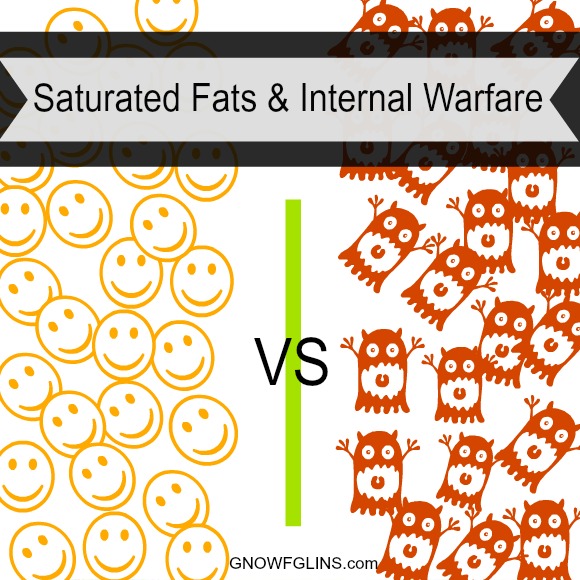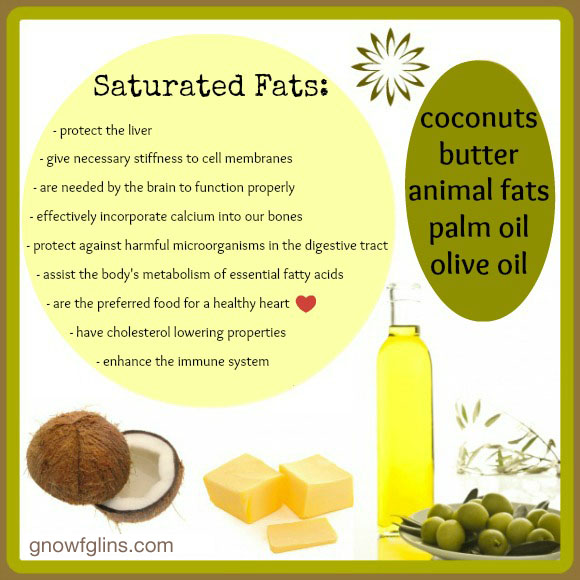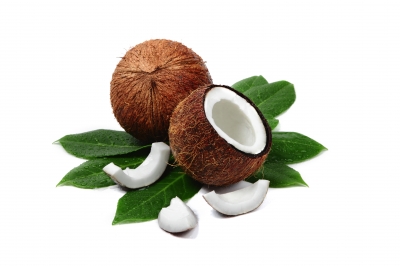
Wars have been around pretty much since time began. Good versus evil. Cops and robbers. You get the point. There are opposing sides to just about everything, and it’s no different in your gut. In fact, there’s a war waging as we speak. You can’t always see or feel it, but it’s happening just the same.
The good guys are fighting to keep you alive and the bad guys want you, shall we say, less alive.
Is it that serious? Sometimes, yes.
Let’s meet the players.
The Bad Fats
Enter the bad guys. Snarling, booing, hissing — yep, throw your rotten tomatoes at them!
Trans Fats (the result of the hydrogenation process):
- cause dysfunction and chaos on a cellular level
- interfere with enzymes your body uses to fight cancer
- interfere with the insulin receptors in your cell membranes
- reduce your immune response
- interfere with enzymes needed to produce sex hormones
- linked to obesity
- can cause major clogging of your arteries
- known to increase “bad” cholesterol, while lowering “good” cholesterol
- have been linked to an increase in asthma
- increase the risk of diabetes
Trans fats are found mostly in margarine and shortening, however, they’re also lurking in fried foods like french fries, doughnuts, and crackers, just to name a few.
Polyunsaturated Fats (canola oil, safflower oil, sunflower oil, corn oil, cottonseed oil, etc.):
- go rancid easily
- create a vitamin E deficiency
- are associated with heart lesions
- become carcinogenic when heated
- cause stress to cellular DNA which can lead to aging, cell destruction, and cancers
- suppress immune system
- inhibit enzymes involved in the digestion of food, removal of clots, and formation of thyroid hormone
The Good Fats
Enter the good guys. The knights on white horses with cheering crowds, smiling babies, and flower-throwing fans. These guys are known as saturated fats.
Saturated fats fall into four categories:
- Short-chain fatty acids are found in butterfat from cows and goats. They protect us from viruses, yeasts, pathogenic bacteria in the gut, and contribute to a healthy immune system.
- Medium-chain fatty acids are mostly found in butterfat and tropical oils like palm oil and coconut oil. They have antibacterial properties and are good for the immune system.
- Long-chain fatty acids are found in tallow from beef or mutton (sheep), animal fats, olive oil, evening primrose oil, and borage and black currant oils. They have antimicrobial properties and are helpful for regulating tissue hormones at a cellular level.
- Very long-chain fatty acids are found in foods like organ meats, egg yolks, butter, and fish oils. They play an important role in the nervous system.
These misrepresented and misunderstood fats are the ones mainstream media commonly tells you to avoid. But the fact is, they’re one of our biggest advocates to health. Here are a few reasons why. They…
- protect the liver
- give necessary stiffness to cell membranes
- are needed by the brain to function properly
- effectively incorporate calcium into our bones
- protect against harmful microorganisms in the digestive tract
- assist the body’s metabolism of essential fatty acids
- are the preferred food for a healthy heart
- have cholesterol lowering properties
- enhance the immune system
They aren’t damaging your body. They are fighting for your health and longevity.
Saturated Fats and the Heart
The French — who love their butter, cheese, cream, eggs, and rich pâtés — have a lower rate of coronary heart disease than any other western country. In the United States, 315 out of every 100,000 middle-aged men die each year from heart attacks. In certain regions of France, where duck and goose liver are a staple, that rate is only 80 out of every 100,000.
In a 60-year period (from 1910 to 1970) the amount of animal fats (saturated fats) eaten per person lowered from 83% to 62%, and the amount of real butter consumed dropped nearly 78%. Today heart disease is on the rise, causing 40% of all deaths in the United States. Doesn’t it seem odd that to protect our hearts we’re told to stay away from saturated fats?
Wynn Institute for Metabolic Research in London performed a medical evaluation regarding the fat found in clogged arteries. Their study showed that only about 26% is saturated fat. The remaining 74% is unsaturated fat.
A Medical Research Council Survey showed that men who eat butter have only half the risk of developing heart disease in comparison to those who use margarine.
Saturated Fats by Percentage
Which fats have the highest amount of saturated fat?
- coconut oil — 92% saturated fat
- animal fats (butter, lard, and tallow) — 40% to 60% saturated fat
- palm oil — 50% saturated fat
- olive oil — 13% saturated fat
The King of Saturated Fats
Truth be told, any of the fats listed above are great, but coconut oil holds a special place in the line up. Not only is it a whopping 92% saturated, but it also contains other phenomenal benefits to fighting the internal war.
Coconut oil is made up mostly of medium-chain fatty acids, which means it is great for the immune system and quickly absorbed for energy. It boasts lauric acid (also found in breastmilk), which has strong antimicrobial and antifungal properties. This is especially important to someone battling candida, an internal bacteria in the gut which can cause leaky gut, brain fog, yeast infections, and a myriad of other health issues.
(For more information about candida, see my books Healing Candida with Food or The Sweeter Side of Candida.)
In conclusion, there are so many ways saturated fats fight for our health. They are essential to a healthy diet. Don’t let the “fat scare” fool you. 😉
Do you still or did you used to buy into the “fat scare”? How do you feel about it now? What are your favorite traditional fats to use in cooking and health and what have they done for you?
Sources: Nourishing Traditions, CoconutSecret.com, Mercola.com, NaturalNews.com, WestonAPrice.org, BalancedBodyMind
...without giving up the foods you love or spending all day in the kitchen!

2 free books:
Eat God's Way
Ditch the Standard American Diet, get healthier & happier, and save money on groceries...
We only recommend products and services we wholeheartedly endorse. This post may contain special links through which we earn a small commission if you make a purchase (though your price is the same).

 (
( (
( (
(
Excellent article! I am going to bookmark this to refer all those people to who still believe in the myth of no saturated fats = good health!
Thanks, Jan! The best way to fight the ‘fat scare’ is to let people know the truth.
Good job on this article. It might interest you to know that polyunsaturated fats also affect intelligence. Excerpt:
Because the first neurons evolved in an environment high in the n?3 (omega-3) fatty acid docosahexaenoic acid (DHA), this fatty acid became a major component of neural structure and function and makes up 10% of the dry weight of the human brain. Since n?3 fatty acids must come from the diet, this suggests a possible positive role for dietary n?3 fatty acids in cognition and a possible negative role for n?6 fatty acids, which compete with n?3 for access to critical enzymes. Because human females must provide DHA for the growth of the unusually large brains of their offspring from maternal fat stored during childhood, their need for DHA is especially great. We used stepwise regression to determine whether particular dietary fatty acids and other nutrients were related to cognitive performance in over 4000 American children aged 6–16 from the Third National Health and Nutrition Examination Survey; a variety of possible biological, social, and environmental risk factors were statistically controlled. In this context the only dietary factors related to cognitive performance were n?3 and n?6 fatty acids. Dietary n?3 fatty acids were positively related to cognitive test scores in male and female children, while n?6 showed the reverse relationship, significantly so in females. In female children the positive effects of n?3 intake were twice as strong as in males and exceeded the negative effects of lead exposure. This suggests that increasing dietary intake of n?3 and decreasing n?6 fatty acids may have cognitive benefits in children, especially in females. http://www.frontiersin.org/Evolutionary_Neuroscience/10.3389/fnevo.2011.00005/abstract
I would say that saturated fats are much needed for brain health and development because God created us with that need. 🙂
Good article. Just wanted to clarify that polyunsaturated fats are not all “bad guys.” Omega 3s and omega 6s are both PUFAs, and you need both, but they should be in balance. Omega 3s are absolutely essential and are anti-inflammatory fatty acids! The modern American diet is just very high in omega 6s (pro-inflammatory) PUFAs and trans fats and low in omega 3s.
Well said. In retrospect, I should have clarified that omega 3’s and 6’s are not *all* bad. But we do tend to eat omega 6’s in excess and we need to be careful with both as they’re highly reactive and go rancid easily, particularly omega 3’s.
The sad thing is the omegas are always emphasized as good without warning about how they’re heated and such while saturated fats are always reported as bad.
Thank you for clarifying this in your comment. 🙂
This article spells it all out. Thank you!
What is palm shortening? Is it much different from palm oil? I was wanting a high temp oil that didn’t have a strong flavor so I got the shortening but wonder if I made a bad choice because it looks like vegetable shortening. Any thoughts?
Hi Amber,
Just read the package to see if it is hydrogenated. It likely has, which means it was altered and therefore no longer good.
I thought this was a good explanation of the difference: http://www.tropicaltraditions.com/organic_palm_shortening.htm
It is a mistake to jump to concusions about this subject. While there is a lot of speculation and outright misinformation there is in fact very little scientific evidence to support this meme. One example of statistical mistake is the heart attack rate in US vs France. First let me point out that the red wine lobby co-opted the credit for low heart attacks. Not sufficient evidence to suport that meme either. But worldwide the biggest risk of heart attack is diabetes. Diabetes is a genetic disorder with blacks, hispanics and American Indians having extremely high rates of diabetes. How many blacks, hispanics and American Indians in France??? Second, heart disease is largely a disease of older people. Low heart disease in Africa because they die of so many other things first. Every 1st world country has a high rate of deaths from heart disease but most of these deaths are end of life situations just as cancer is largely a disease of old age.
It is likely that eating saturated fats won’t kill you any quicker then unsaturated fats. In fact our entire population in the US was raised on saturated fats since the technique was dicovered in the 40’s and our life expectancy has increased every year since.